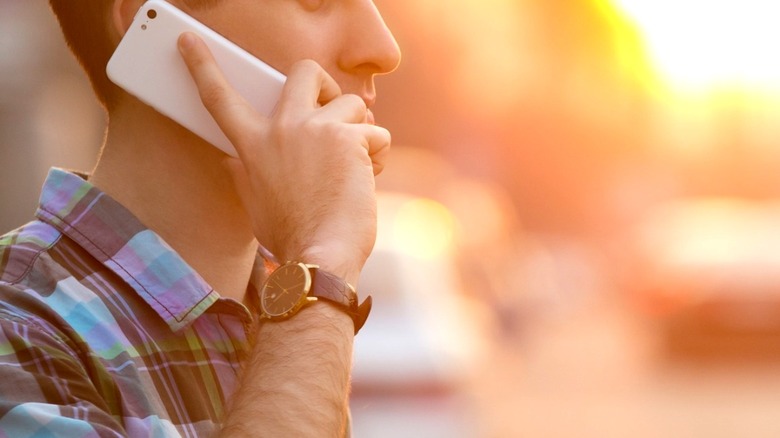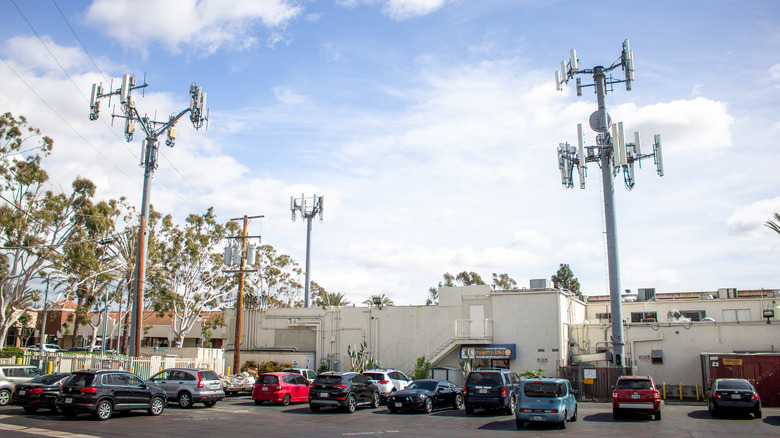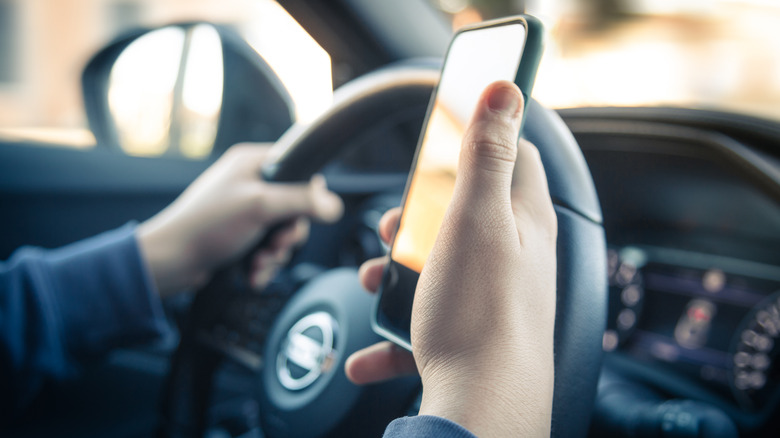The Big Myth About Cell Phones You Need To Stop Believing
Smartphones are in the hands of almost everyone and emit radiofrequency radiation for their basic operations. Should people be worried about the potential risks of cancer due to cell phone use? Bank My Cell reports that as of May 2022, there were 6.648 billion smartphones in the world. The total number of mobile phones (including "dumb" phones) globally is larger with 7.26 billion users, which is 91.54% of the total population. IoT cellular connections are even higher at 10.57 billion. Asurion reports that Americans check their smartphones 96 times a day in this hyperconnected world — that works out to about once every 10 minutes or so.
With smartphone use rapidly intensifying, wireless service providers have been working to roll out 5G networks around the world — something that has raised concerns in the past from government authorities over its potential health consequences (via Wired). Portland, Louisiana, and Bay Area towns all passed resolutions seeking to clarify the possible risks. If you're concerned smartphones may result in long-term health problems, there's good news: respectable scientific reports and health authorities say there is no evidence linking the technology with cancer.
Science addresses the myth that smartphones cause cancer
The CDC, FDA, and National Cancer Institute all agree there's no scientific evidence linking exposure to the radiofrequency radiation generated by cell phones with cancer or any other health problem. The National Institute of Cancer says that there hasn't been an increase in brain or central nervous system cancers since smartphones were adopted. The organization also warns that studies that alerts about a historical rise in cancer are "not consistent with incidence data" and instead are biased. "Evidence to date suggests that cell phone use does not cause brain or other kinds of cancer in humans," the National Institute of Cancer concludes.
It's advice echoed by the U.S. Centers for Disease Control and Prevention. The CDC explains that cell phones emit radiofrequency radiation (RF), which is different from other types of radiation (like X-rays) known to be harmful. While the International Agency for Research on Cancer (IARC) has classified RF radiation as a "possible human carcinogen," the CDC reassures the population that there is no scientific basis linking cancer with cell phones.
Be careful reading too much into scare-studies
In 2018, a government study attracted global attention by investigating cell phone radiation effects on mice and rats (via The New York Times). Conducted by the National Toxicology Program (NTP), it prompted concern after some of the test animals exposed to RF energy showed signs of carcinogenic activity in their bodies.
The FDA responded to the findings of the study, pointing out that the researchers had exposed male rats to radiofrequency energy levels at "much higher rates than the current safety standard" used by the industry. "The levels and duration of exposure to radiofrequency radiation were much greater than what people experience with even the highest level of cell phone use," the FDA said, adding that the findings did not apply to humans. It's a message that the NTP itself repeated, cautioning in a statement that what happened to the animals should not be extrapolated to potentially happening to humans, and pointing out that it used 2G and 3G frequencies and modulations that are progressively being replaced by different 4G, LTE, and 5G versions.
The risks you really need to worry about
The experts aren't saying that RF energy has no impact at all on the human body. What phone-users should bear in mind, though, is just how that impact actually manifests. That's mainly through heat, known as "thermal" effects, the FCC explains. RF energy can heat up biological tissue very rapidly — as a microwave demonstrates — and so could, in theory, damage our bodies if we can't dissipate that heat in the process. The levels of RF energy required for that, though, are well in excess of what the typical smartphone emits.
Indeed, if you're looking for a way to be safer with your cellphone, there's one very easy route: putting it down while you're behind the wheel of your car. "The most consistent health risk associated with cell phone use is distracted driving and vehicle accidents," the National Cancer Institute warns, highlighting the persistent dangers that multiple agencies and studies have concluded present a significant danger to life. Previous research has concluded that things like texting can cause drivers to lose their "sixth sense" for safety on the road, leaving their steering more jittery, and even causing them to creep between lanes.



